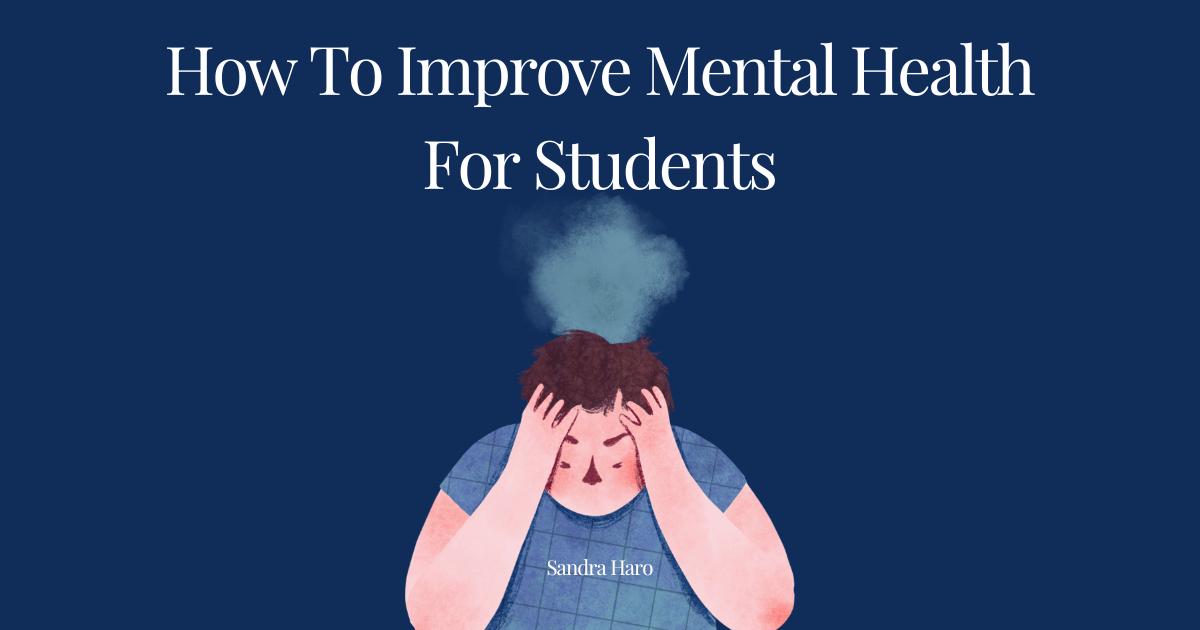Feeling restless by school and college? You’re not alone. How To Improve Mental Health For Students? Due to classes, social life, and personal stuff can be tough on your mental health. But don’t worry, there are ways to cope and thrive! This guide is packed with practical tips to help you stay well-balanced and energized throughout your academic journey.
Why’s mental health so important for students?
School can be a rollercoaster! Tests, deadlines, trying to fit in – it’s all normal, but it can take a toll on your mental well-being. Taking care of your mind is just as important as taking care of your body, and it can help you succeed in all areas of life.
Navigating the Complexities:
School and college life presents various challenges that can significantly impact a student’s mental well-being. This article delves into common issues and explores key strategies for promote emotional flexibility and success.
How To Improve Mental Health For Students
Common Challenges:
Academic Pressure: The pursuing of high grades, tight deadlines, and competitive environments can trigger stress, anxiety, and burnout. Imagine a student experiencing sleep disturbances and difficulty focusing during stressful exam periods.
Social Anxiety: Many students grapple with social interactions, making new friends, participating in groups, or public speaking. This can hinder their ability to socialize and connect with others, like a freshman feeling anxious about attending orientation events.
Financial Worries: Tuition fees, living expenses, and student loans create financial burdens that exacerbate stress and anxiety. Students might struggle to afford basic necessities or worry about their future, like someone working multiple jobs juggling work and academics.
Homesickness: Leaving familiar surroundings and loved ones behind can lead to homesickness, loneliness, and isolation. Think of an international student adjusting to a new culture and environment.
How To Improve Mental Health For Students
Create Your Own Solution:
Fuel Your Brain:
- Sleep like a champ:Aim for 7-8 hours of shut-eye each night to keep your brain happy and focused.
- Eat yummy brain food:Fill your plate with fruits, veggies, and whole grains to give your brain the energy it needs.
- Get moving:Exercise regularly to melt away stress, boost your mood, and feel energized.
Chill Out & Stay Cool:
- Breathe deep:Before a big exam or when feeling stressed, take some deep breaths to calm your mind and clear your head.
- Relax your muscles:Imagine tension melting away with progressive muscle relaxation, a technique that helps you de-stress both physically and mentally.
Be Good to Yourself:
- Treat yourself like a friend:Show yourself some kindness and understanding, just like you would a good friend.
- Think about the good stuff:Take some time each day to appreciate the positive things in your life, big or small.
Find Your Crew:
- Hang out with others:Join clubs, volunteer, or chat with friends and family for some social support.
- Talk to a pro:Counselors and therapists can offer personalized advice and strategies to help you navigate challenges.
Tailored Tips for Common Issues:
- Feeling test anxiety?Combine relaxation techniques with time management skills to ace your exams.
- Social media got you down?Set some boundaries to avoid comparing yourself to others.
Remember, Help is Here:
- Your school can help:Talk to your counselor, join support groups, or use online resources offered by your university.
How To Improve Mental Health For Students
Beyond the Checklist: Cultivating a Growth Mindset:
Don’t let challenges stop you! Think of them as stepping stones to learn and grow stronger. See mistakes as chances to get better, not dead ends.
Get to know yourself! Writing down your thoughts and feelings can help you understand why you react the way you do, making it easier to handle tough emotions.
Take care of yourself! Do things you enjoy like exercise, hobbies, and relaxing activities to avoid feeling burned out. This helps you stay your best self.
Conclusion:
Prioritizing your mental health is crucial for success in school and college, friendships, and life. By using these tips, seeking support, and creating a supportive environment, you can build resilience and thrive throughout your academic journey. Together, we can create a space where every student feels empowered to prioritize their well-being and reach their full potential.
Got Questions? We’ve Got Answers:
Q: How to deal with school stress?
Manage your time well, set realistic goals, get help when needed, and relax with meditation or yoga.
Q: Do extracurricular activities help?
Absolutely! Joining clubs or sports can boost your mood, help you make friends, and reduce stress.
Q: Is feeling homesick normal?
Yes! Especially when starting somewhere new. Connecting with loved ones, building new friendships, and seeking support can help.
Q: How can teachers help?
Teachers can create supportive classrooms, encourage open discussions about mental health, and connect students with resources.
Q: Does exercise matter?
You bet! Regular physical activity reduces stress, improves mood, and boosts memory, making it a win-win for your mind and body.
Q: How can parents help?
Open communication, emotional support, and encouraging healthy habits like good sleep and balanced meals are key for parents to support their children’s mental health.
Also Read: How To Improve Mental Health For Working Professionals
